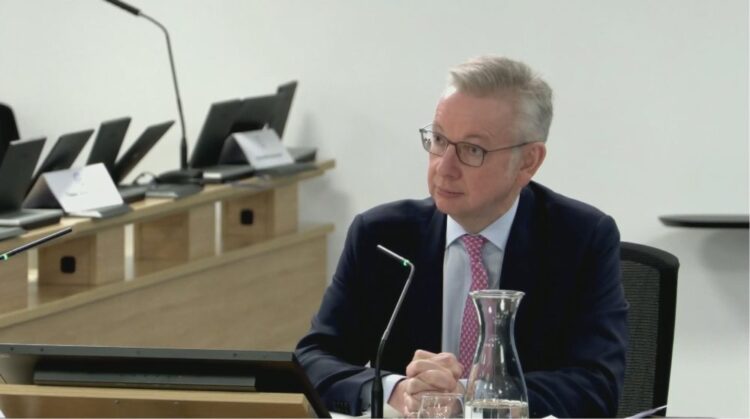By Gabriel Princewill-
Michael Gove’s swearing on the political whatsApp group during the heights of the pandemic, set very poor standards for the political world.
Revelation of his crude language during the covid inquiry has prompted deeper evaluation of his conduct, raising questions about its prevalence in parliament. Just how unacceptable swearing among the political elites in the course of their duty should be is a pertinent question.
The use of profanity by Members of Parliament (MPs) during the course of their professional engagements is a disconcerting trend which appears to have crept into the sacred sanctuaries of political power for years now.
Only last year November, it was revealed that former education Secretary Gavin Williamson, sent an expletive laden message to Wendy Morton, who served as the chief whip under Liz Truss’s leadership.
In the grand halls of Westminster, where debates and decisions shape the destiny of a nation, one would expect the discourse to be elevated, polished, and indicative of the highest standards of professionalism.
The recent revelation of expletive-laden WhatsApp messages from Cabinet minister Michael Gove makes it critical to explore whether our elected representatives are living up to the ethical standard expected of their esteemed positions.
Michael Gove, a key figure in the British government and known for his roles in various high-profile portfolios, let the eyes and ears down by immaturely normalizing swearing whilst communicating with his colleagues who were meant to be running the country during the pandemic.
WhatsApp messages between Gove and former Downing Street aide Dominic Cummings, exchanged in March 2020 during the early days of the Covid-19 pandemic, were laid bare before the public as part of the covid inquiry.
In those messages, Gove expressed frustration, stating, “I don’t often kick off. But we are fing up as a government and missing golden opportunities.” Cummings, in turn, called the Cabinet Office a “fing joke”, and accused it of lying about having a plan to deal with the pandemic.
While these messages provided a behind-the-scenes glimpse of the pressure-cooker atmosphere within the government, they also raised questions about the appropriateness of language used by those entrusted with the highest echelons of power.
The incident prompted Gove to publicly apologize for his reproachable conduct which he played down by saying these things happen.
MPs Ought To Be Standard Bearers of Good Ethics
Members of Parliament, as elected representatives of the people, are expected to be standard bearers of good ethics and conduct. They are the voices of the public in the legislative chambers, and their behaviour is scrutinized not just by their constituents, but by the world at large.
When they bring the woeful flaws of their developmental years into one of the most important offices in the country, it begs the question how much training and direction many Mps themselves may need.
MPs are expected to embody the ideals of integrity, respect, and professionalism.
However, incidents like the Gove revelation challenge this assumption. The use of profanity, even in the heightened stress of political decision-making, raises questions about the decorum and ethical grounding of our elected representatives.
In the eyes of many, the conduct of MPs should be a shining example for the citizens they serve, reflecting the principles of civil discourse and responsible leadership.
‘The use of swear words by MPs not only challenges the perception of them as ethical standard bearers, but also presents them as school kids in need of guidance themselves’, said Joshua Hopwood, a teacher and researcher .
‘The corridors of power should resonate with intellectual debates, reasoned arguments, and a commitment to the welfare of the nation. However, instances of MPs resorting to profanity create an image more akin to a chaotic schoolyard than the pinnacle of democratic governance.
‘The public, who entrust these individuals with the solemn duty of making decisions on their behalf, may view such behavior as a breach of trust. Instead of being the wise elders guiding the nation through challenges, MPs swearing in the hallowed halls of Parliament may be perceived as unruly adolescents in need of a stern reprimand.
The Impact on Political Culture
The language used by MPs is not just about individual behavior but contributes to shaping the political culture of the nation.
Profanity as an accepted part of political discourse may erode the respect the public holds for the institutions of democracy.
The parliamentary setting, traditionally a symbol of decorum and respect, may be tainted by a culture of casual, even vulgar, language.
The erosion of respect for political institutions could lead to a disillusioned electorate, further contributing to the growing cynicism surrounding politics.
It becomes a cycle where a perceived lack of ethical conduct by MPs fosters public mistrust, and in turn, public mistrust allows for a more relaxed approach to standards of behavior.
In the aftermath of the Gove incident, his public apology is most welcome, and a positive step in the right direction. Acknowledging the lapse in judgment and expressing remorse are vital components of rebuilding public trust.
Apologies alone may not be enough; there needs to be a collective effort to foster a culture of respect and responsibility within political spheres.
MPs should be mindful that every word they utter, even in private conversations, has the potential to shape the narrative of their commitment to ethical governance.
Raising the Bar of Political Discourse
The revelation of profanity in political communications should not be an opportunity for public shaming, but a catalyst for positive change.
MPs need to take a moment to reflect on their role as leaders and representatives, and commit to raising the bar of political discourse.
This requires a renewed emphasis on cultivating an environment where respectful disagreement is the norm, and the language used reflects the seriousness of the issues at hand.
Setting an example for the next generation of leaders and ensuring that political engagement remains a noble pursuit characterized by intellect, empathy, and responsibility is a worthwhile objective to achieve.




